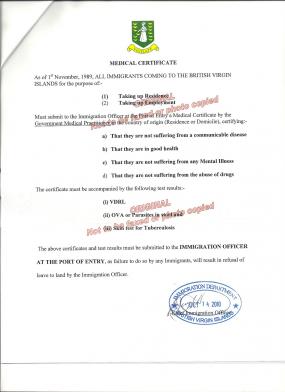Press Release
 Effective January 1, 2018, persons entering the British Virgin Islands for the purpose of work and to reside, now have the option to either submit medical certificates from their place of origin at the port of entry, as is the current practice, or to undergo medical examinations locally with a medical practitioner of choice.
Effective January 1, 2018, persons entering the British Virgin Islands for the purpose of work and to reside, now have the option to either submit medical certificates from their place of origin at the port of entry, as is the current practice, or to undergo medical examinations locally with a medical practitioner of choice.
A recent review of the immigration medical requirements also determined that it is no longer necessary to test for latent tuberculosis, parasitic infestations or other gastrointestinal infections. Therefore, Mantoux and stool tests are no longer required.
The changes to the immigration medical requirements are part of efforts by the Department of Immigration and the Ministry of Health and Social Development to facilitate an easier process for persons relocating to the BVI. The changes are also part of the BVI Forward initiative to Reform Immigration and Labour.
The flexibility provided by the amended requirements means that persons are no longer mandated to have medical certificates upon entry to the territory but can opt to have their medicals done locally in order to be deemed free of infectious diseases such as tuberculosis, yellow fever, malaria, plague, viral haemorrhagic fever and West Nile virus.
Persons who choose to have their tests done abroad now also have the option of getting their tests verified by any physician registered in the BVI or at the Government Clinic which is conducted Monday to Thursday in the emergency area of the old Peebles Hospital.
Explaining the new option Medical Officer of Health, Dr. Ronald Georges said, "Persons can obtain a medical form online which lists the required tests; get the tests done locally or in their country of origin; provide the results to a BVI licensed medical practitioner when they arrive in the Territory. The examining physician at the Immigration Medical Clinic or in his/her private practice will retain the test results and issue a Medical Certificate, indicating whether or not the individual is deemed fit and clear of any contagion or infectious disease."
Referring to the elimination of the Mantoux and stool tests, Dr. Georges said, “Based on the feedback received, we determined that some tests were outdated and persons had difficulty finding physicians to administer them. Our review also found that the screening for some diseases is not a cost effective measure for their prevention and we have discontinued those.”
The immigrant medical examination is only intended to screen for certain medical conditions and should not be considered a complete physical examination. However, it will include at a minimum, examination of the eyes, ears, nose, throat, extremities, heart, lungs, abdomen, lymph nodes and skin.
Chief Immigration Officer, Mrs. Geraldine Ritter-Freeman said in support of the initiative, "It is important that we make immigration processes as seamless and less burdensome as possible. The Department of Immigration is committed to operational improvements that not only increase departmental efficiency but also provide better service to our customers."
As part of the public awareness plan to spread word of the changes, two brochures have been produced, one targeted at prospective immigrants and the other, for examining physicians.
The brochures provide information on the medical examination requirements including the recording of medical history and conditions such as immunisation, tuberculosis, mental health issues and chronic conditions.

